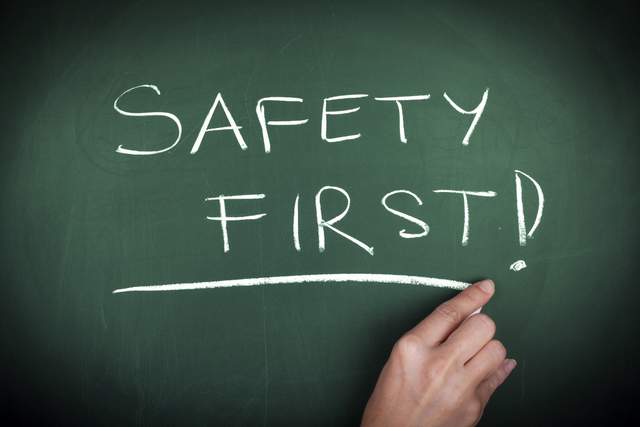
As the economy continues to reopen and diners are finally back on the scene, breweries are filling up again. People are looking to get out and enjoy long-delayed social outings, and breweries can make the perfect spot for social gatherings.
After more than a year of COVID-19-related shutdowns, capacity limitations and more, brewery owners are ready to get back to business and enjoy a boost in revenue. That said, as things pick up inside the brewery from tap room sales to beer production, brewery owners and managers must ensure they and staff don’t lose sight of safety.
From boiler/machinery perils to kitchen fires, staff members need to be prepared for hazards that could severely damage the brewery’s operations or worse – put customers or staff at risk. The best way management can prepare their team is to understand their brewery’s unique risk exposures.
Boiler and Brew Kettle Safety
For any brewery, boilers, tanks and machinery are essential to brewing operations. The boiler is the backbone of the brewing process, powering the brew kettle to boil the hops & grains. Any damages to either of these appliances can derail the entire beer-making process, making proper safety measures essential.
Boiler and brew kettle disasters often occur behind the scenes but can reverberate across the entire operation. If the brew kettle isn’t properly pressurized, it could explode. Further, if staff were to forget to open or shut a valve on the kettle, different liquids could be combined or spilled, which could create spoiled batches and safety hazards.
For example, a brewer attempting to perform maintenance on a brew kettle sustained serious burns to his legs and feet. When the brewer noticed the brew kettle was not sealed properly, he went to reseal it. As he approached the kettle, boiling water began to rush out filling his waterproof rubber boots he was wearing and leaving him with severe burns.
At a brewery, boiler safety should go hand-in-hand with brew kettle safety. If the boiler explodes, the brewery will likely have to shut down the entire brewing process and other operations. But it’s not just an explosion that can damage a boiler. In at least one instance, a forklift crashed into a fermentation tank, rupturing the tank and causing it to collapse inward like an aluminum can. This forced the brewery to halt operations and led the brewery owner to file several claims.
Neglected maintenance is also a frequent source of boiler/machinery related insurance claims. Specifically, we’ve seen incidents of faulty/worn gaskets or valves that were never replaced or inspected by professional plumbers. As most insurance policies don’t cover wear and tear, these incidents can prove significantly costly for unprepared brewery owners.
So, what steps can brewery owners and management take to prevent these types of dangers?
- Proper training is essential. New employees should shadow an experienced individual for at least a month before taking on certain tasks on their own.
- Set a regular maintenance schedule, with at least one inspection a year, if not more. This can help ensure there aren’t faulty valves or severe wear and tear on equipment.
- Consider purchasing new equipment when needed, rather than repairing outdated equipment. Proper installation of new equipment by a licensed professional is critical.
Forklift and Line Safety
Forklift safety is a major issue for any business that uses them, let alone breweries. Accidents can stem from untrained drivers, collisions, loading and unloading and more. Forklifts are often used by breweries to move large items around, and if not properly used they can lead to injuries and costly accidents, as outlined with the ruptured tank reference above.
To prevent accidents involving forklifts onsite, brewery staff should make sure driving paths are clear and that any drivers are properly trained to operate a forklift. They should not only know how to drive the forklift, but how to load and unload it properly, stacking product to safe levels. Further, forklifts should be serviced regularly to ensure that all safety features are working properly.
Bottling and canning lines can also threaten the safety of employees. For starters, employees can catch body parts in those machines if not careful. Incidents have been reported where staff members were trying to clear blockages in the lines and lost an extremity or limb. One of the best ways to keep staff safe is to ensure that your canning and bottling lines have an emergency shutdown button, so that if anything does go wrong, the lines can be stopped immediately, and any harm can be minimized.
Customers can also be placed at risk without proper safety measures. Make sure your brewery has appropriate roadblocks from the taproom to the tanks, so that wandering customers cannot easily access manufacturing areas. Just a few years ago, a woman on a brewery tour rested her hand on a running brew kettle and suffered significant bodily harm. With proper barriers and monitoring, incidents like this can be prevented.
Kitchen Safety
Breweries are increasingly offering food and establishing kitchen operations. Both small and large breweries often have kitchen equipment that can pose risks to staff members if proper safety measures are not taken, such as pizza ovens, deep friers and more.
Once again, proper maintenance and training are essential to limiting these risks. Hoods and ducts should be cleaned at least twice a year, if not quarterly. Staff should regularly check to ensure sprinklers are properly working as well. Lastly, there should be established barriers between the deep fat fryer and open flames.
Breweries serving food should also be careful with their ingredients. Kitchen workers will want to regularly check any cooking ingredients to make sure they are fresh and not expired so they do not serve customers spoiled food. Keeping track of food freshness is essential to keeping the brewery and its customers safe from unneeded risks.
Furthermore, before serving any food, staff should check with customers to ensure they do not have any food allergies. If breweries are not careful around allergies, they could be held liable. For example, if a customer with a peanut allergy was served an item with peanuts, after the staff was alerted of the allergy, the brewery could be hit with a heavy claim. Therefore, kitchen staff should be alerted immediately of any allergy and should be careful when preparing the food to avoid cross-contamination and be sure to not serve as potentially allergenic foods to customers.
Breweries are back. As an industry, let’s enjoy this boon together and do it safely with proper risk management practices in place. Strong safety measures at all levels of the production process, in the kitchen and beyond can help keep your business and its customers stay safe as people enjoy your services this summer and beyond.
Paul Martinez is program manager and insurance brewmaster for Brewery PAK Insurance Program. Martinez has 20+ years of commercial insurance experience and 10 years of experience underwriting breweries.




Leave a Reply
You must be logged in to post a comment.